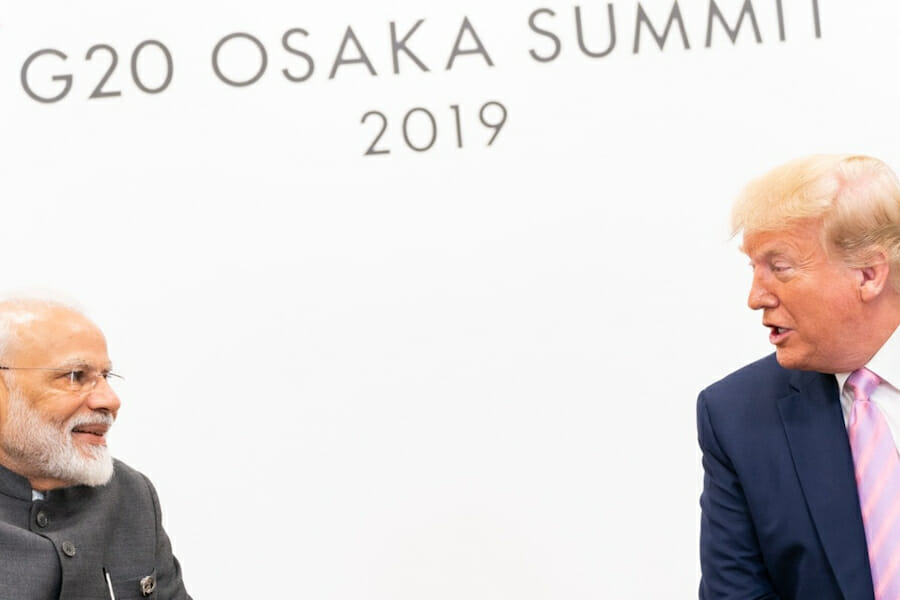
In Exchange for U.S. Help on Kashmir, India will have to Concede on Trade
The ramifications of the Indian government’s controversial decision in August to remove special status from the state of Jammu and Kashmir has been hotly debated. India’s stand has been supported by most major countries, including the United States. However, the Indian government must be under no illusions that to ensure continued support on Kashmir, it will have to provide the United States with significant concessions on trade.
India needs the support of most western countries to keep Kashmir on the backburner at the United Nations, while Pakistan and its “all-weather ally,” China, will continue to highlight the issue at the international level. The recent back-and-forth between India and Pakistan at the UN Human Rights Council in Geneva is a testament to this fact. India will therefore have to focus on obtaining the support of the other four permanent members of the UN Security Council to neutralize Chinese and Pakistani efforts.
Within the five permanent members of the UN Security Council, the United Kingdom will try to balance both Pakistan and India since it has sizable domestic constituencies of both Indians and Pakistanis. Russia has supported India thus far, but it remains to be seen if such unequivocal support will be forthcoming in the future as it increasingly becomes more economically dependent on China. On the other hand, France can be expected to back India for the foreseeable future as bilateral relations have grown stronger and it seeks to become a bigger defense supplier to India.
Most of the focus will, however, have to be on the United States as the most powerful and influential country in various international organizations. Having the United States in India’s corner will be crucial for the Indian government’s goal to smoothly integrate Kashmir with the rest of the country and without drawing negative international attention. Many smaller nations will follow the United States’ lead on Kashmir. Additionally, explicit U.S. support for India can act as a deterrent to Pakistani or Chinese attempts to have India proscribed for human rights abuses and other violations in the region at the UN and other international bodies.
Thus far, the United States has largely backed the Indian position on Kashmir, but it would be foolish to take this support for granted. While it is true that both countries see each other as “natural allies” and the United States is counting on India to help contain China in Asia, it is also true that the United States is currently led by a president who is extremely transactional in nature and has a very limited sense of history, precedence, and wider geopolitical strategic considerations.
President Donald Trump has already shown that he is willing to discard diplomatic conventions and long-term strategic considerations in favor of short-term “wins,” as he calls them. This is most apparent in trade policy, which is a pet Trump issue and a key campaign plank. Since his inauguration, Trump has consistently upended trade relationships with long-standing U.S. allies such as Canada, Japan, and the EU using a combination of both security and economic leverage.
It is also no secret that Trump has time and again criticized Indian trade policies, calling India a “tariff king.” The U.S. government has also sought to pressure India on trade by removing trade benefits under the GSP program; it is now threatening a Section 301 action against India that could conceivably raise tariffs on all Indian exports into the United States, similar to how it has raised tariffs on almost all Chinese exports.
The recent developments in Kashmir will now provide Trump with additional leverage to force India to accept many of his demands. Trump knows that India does not want international attention on Kashmir and would rather that it simply just “dies down.” He also knows that it is a complete anathema to India to have any third-party mediation in the Kashmir dispute with Pakistan. India’s position on Kashmir has always been that it is purely a bilateral issue between India and Pakistan and no external intervention is necessary.
It is easy to dismiss Trump’s recent posturing on mediation in Kashmir as off-the-cuff remarks, but a more prudent analysis would consider that these statements were intentional to remind India that he can make life difficult for it on Kashmir. Therefore, India needs to provide him with some “wins” on trade in exchange for his continued support. Considering that the United States is heading into an election year in 2020, striking a deal with India on trade can be a major boost for Trump going into his re-election campaign.
To its credit, the Indian government seems to have recognized this and both Prime Minister Narendra Modi and Commerce Minister Piyush Goyal are scheduled to travel to the United States next week to finalize a trade package. Recent signals from the government, including PM Modi’s hints during his meeting with Trump at the G7 Summit in Biarritz, France, suggest that the Indian government is prepared to meet U.S. demands on key issues such as medical devices, dairy, other agricultural products, and ICT tariffs.
The question still remains whether what the Indian government offers on trade will be enough to satisfy Trump and his hard-nosed trade chief, Robert Lighthizer. Consequently, the Indian government will need to navigate a fine line that addresses U.S. demands while also minimizing domestic criticism. The next few days will therefore be critical.
